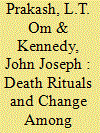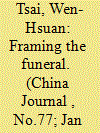| Srl | Item |
| 1 |
ID:
178424


|
|
|
|
|
| Summary/Abstract |
This article examines changes in the death rituals performed among Hindu Nadars in a South Indian village. It emphasises the importance of understanding ritual changes within their specific micro-level local contextual framework, including changing social structures at household and village level. This empirical evidence showcases how changing rituals connected to death reflect various adaptations through imitation, substitution and alteration of specific ritual elements and performants. It also identifies emerging class distinctions among Nadars and their connection with changes in rituals associated with death. This analysis of the changes depicts how Nadars use ritual actions in pragmatic ways, symbolically expressing and realising their aspirations for status enhancement through such ritual performances.
|
|
|
|
|
|
|
|
|
|
|
|
|
|
|
|
| 2 |
ID:
151715


|
|
|
|
|
| Summary/Abstract |
Influenced by Confucian culture and Soviet traditions, the Chinese Communist Party (CCP) gives special attention to the arrangements for officials’ funerals. The format of these funerals is framed according to the officials’ rank and political performance. This article primarily discusses the funerals of national leaders and identifies five different roles: great leader, eminent leader, deposed leader, political offender, and political traitor. The leaders are given more stately funerals in accordance with how closely their performance in life is in accordance with the expectations of the Party. Through framing funerals, the leaders of the CCP seek to reinforce their personal political beliefs, as well as the ruling hegemony and legitimacy of the regime.
|
|
|
|
|
|
|
|
|
|
|
|
|
|
|
|